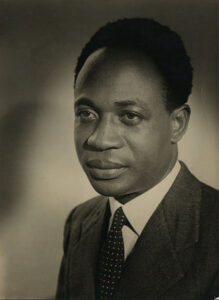The Life and Times of Kwame Nkrumah

Early Life and Education
Kwame Nkrumah was born on September 21, 1909, in Nkroful, a small town in the Western Region of the then Gold Coast (now Ghana). He grew up in a modest family and was raised in a deeply traditional and religious environment. His early education was in Catholic missionary schools, and he later attended Achimota School in Accra, where he began to show intellectual brilliance and a passion for leadership.
In 1935, he traveled to the United States to pursue higher education. He enrolled at Lincoln University in Pennsylvania, where he studied economics and sociology, later earning degrees in philosophy and theology. He also attended the University of Pennsylvania, where he deepened his understanding of philosophy, education, and politics. During this period, Nkrumah was exposed to Marxist, socialist, and Pan-Africanist ideas, which would shape his worldview.
Political Awakening in the Diaspora
While in the U.S., Nkrumah became actively involved in African student movements. He was influenced by the writings and activism of Pan-African leaders like Marcus Garvey, W.E.B. Du Bois, George Padmore, and C.L.R. James. He participated in discussions on colonialism, racism, and the liberation of Africa. His time in the U.S. was crucial for nurturing his belief in Pan-African unity as the key to Africa’s liberation.
In 1945, Nkrumah moved to London, where he co-organized the Fifth Pan-African Congress in Manchester alongside George Padmore and Jomo Kenyatta. The Congress gathered African and Caribbean intellectuals, workers, and students to chart a path toward independence from colonial rule. This event cemented Nkrumah’s role as a rising Pan-Africanist voice.
Rise to Power in the Gold Coast
In 1947, Nkrumah returned to the Gold Coast at the invitation of the United Gold Coast Convention (UGCC), a political group advocating for independence. He soon broke away to form the Convention People’s Party (CPP) in 1949, adopting the slogan “Self-Government Now.” His ability to mobilize the masses through rallies, strikes, and grassroots campaigns distinguished him from other leaders.
In 1951, while still in prison for political agitation, Nkrumah’s CPP won a sweeping election victory. He was released and became Leader of Government Business, later Prime Minister. On March 6, 1957, under his leadership, the Gold Coast gained independence and became Ghana, the first sub-Saharan African country to achieve independence.
Contributions to Pan-Africanism
1. Ghana as the Spark of African Liberation
Nkrumah viewed Ghana’s independence as incomplete unless all of Africa was free. His famous words on independence day were:
“The independence of Ghana is meaningless unless it is linked up with the total liberation of Africa.”
He turned Ghana into a base for liberation movements, offering training, funding, and diplomatic support to anti-colonial struggles across Africa, from Algeria and Congo to Southern Africa.
2. Pan-African Vision and Advocacy
Nkrumah was a leading advocate for the United States of Africa—a continental government with a single army, foreign policy, and economic system. His book “Africa Must Unite” (1963) outlined his vision of a politically and economically integrated Africa, warning against the dangers of neo-colonialism and foreign exploitation.
He also proposed the creation of African institutions like:
-
A Common African Defense Force
-
A Common Currency and Central Bank
-
A Continental Market
Though these ideas faced resistance from other African leaders who favored gradualism, they remain central to Pan-African discourse today.
3. The Organization of African Unity (OAU)
In 1963, Nkrumah played a key role in founding the Organization of African Unity (OAU) in Addis Ababa, Ethiopia (now the African Union). While his call for immediate continental unity was not fully embraced, the OAU institutionalized Pan-African cooperation, setting a foundation for later integration efforts.
4. Intellectual and Ideological Legacy
Nkrumah developed the concept of “Consciencism”, a philosophy blending traditional African values with socialist thought. He promoted scientific socialism as the path for Africa’s development, arguing that political freedom must be matched with economic independence.
Through his writings (Neo-Colonialism: The Last Stage of Imperialism, Dark Days in Ghana, Revolutionary Path), he exposed how new forms of foreign domination threatened Africa’s sovereignty.
5. Global Influence
Nkrumah forged alliances with African-Americans and leaders of the Non-Aligned Movement. He worked with leaders like Julius Nyerere, Gamal Abdel Nasser, Patrice Lumumba, and Sekou Touré, and supported liberation movements in Southern Africa. His global advocacy made him one of the most recognized African leaders of the 20th century.
Challenges and Decline
Despite his vision, Nkrumah’s government faced internal challenges:
-
Economic difficulties due to ambitious industrial projects and falling cocoa prices.
-
Growing authoritarianism, including the one-party state system and the Preventive Detention Act, which curtailed political freedoms.
-
Cold War interference, as Western powers feared his socialist leanings and ties with the Eastern bloc.
In 1966, while on a peace mission to Vietnam, Nkrumah was overthrown in a CIA-backed coup. He lived in exile in Guinea, where President Sekou Touré made him honorary co-president. He continued writing and advocating for Pan-Africanism until his death in Bucharest, Romania, on April 27, 1972.
Legacy
Kwame Nkrumah remains a towering figure in African history. His contributions can be summarized as:
-
Political Pioneer: Led Ghana to independence, inspiring other African nations.
-
Pan-African Visionary: Advocated for continental unity and laid the foundations of the African Union.
-
Intellectual Architect: Developed ideas on socialism, neo-colonialism, and African identity that continue to influence scholarship.
-
Global Symbol: A champion of African dignity and self-determination, celebrated worldwide as a revolutionary leader.
Today, debates around African integration, economic independence, and neo-colonial exploitation echo Nkrumah’s warnings and dreams. His life reflects both the promise and challenges of Pan-Africanism, making him a figure of enduring relevance.
✨
